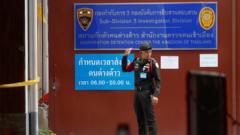The release of Osama Almasri Najim, implicated in serious human rights abuses, raises serious questions about Italy's judicial processes and its political motivations in migrant-related agreements with Libya.
**Libya War Crimes Suspect Released Amid Controversy over International Warrant Errors**

**Libya War Crimes Suspect Released Amid Controversy over International Warrant Errors**
Italian authorities face backlash as a Libyan war crimes suspect walks free due to flaws in his arrest warrant, igniting debates on migration policy.
Italian Justice Minister Carlo Nordio confirmed that Osama Almasri Najim, the head of Libya's judicial police, was released due to "errors and inaccuracies" in the arrest warrant issued by the International Criminal Court (ICC). Najim was taken into custody in Turin on January 19 but was flown back to Libya two days later on an Italian military aircraft.
Facing charges including murder, rape, and torture related to brutal conditions at Tripoli's Mitiga detention centre, Najim's swift release has led to outrage from opposition political parties and human rights organizations. Nordio criticized the warrant as filled with "inaccuracies, omissions, discrepancies, and contradictory conclusions," indicating that Italy could not hold Najim legally.
Interior Minister Matteo Piantedosi stated that Najim posed a "national security risk" which justified his expulsion. Images circulated in Libyan media showed Najim being welcomed back excitedly. The ICC has demanded clarification from Italy regarding this situation.
Criticism intensified, particularly from Elly Schlein, leader of the opposition Democratic Party, who accused Nordio of acting as a "defense lawyer for a torturer." Prime Minister Giorgia Meloni confirmed that she, along with Nordio and Piantedosi, is under investigation for their roles in Najim's release, with a special court established for ministerial cases.
Survivors of torture, including South Sudanese David Yambio, expressed feelings of betrayal. Yambio recounted his harrowing experiences at Mitiga prison, where he claims to have suffered and witnessed severe abuse, linking Italy's actions to complicity in the atrocities.
Despite being a signatory to the ICC, Italy's decision to release Najim has led to accusations that its political and economic interests with Libya influenced judicial choices. Since 2017, with deals made to support the Libyan coastguard’s interception of migrant boats, NGOs have condemned the ethical implications of such agreements.
As the case continues to dominate headlines, skepticism remains about whether the ongoing investigation will truly address the complex relationship between Italy and Libya over migration. Observers note that Libya's leverage highlights Italy’s vulnerability concerning its national migration strategy—an essential component of Meloni's policy framework.
For Yambio and other survivors of Najim's alleged crimes, the release signifies a profound betrayal. They are calling for an end to the Italy-Libya migration pact and for accountability, stressing that they continue to bear witness to the crimes committed under Najim's authority.
Facing charges including murder, rape, and torture related to brutal conditions at Tripoli's Mitiga detention centre, Najim's swift release has led to outrage from opposition political parties and human rights organizations. Nordio criticized the warrant as filled with "inaccuracies, omissions, discrepancies, and contradictory conclusions," indicating that Italy could not hold Najim legally.
Interior Minister Matteo Piantedosi stated that Najim posed a "national security risk" which justified his expulsion. Images circulated in Libyan media showed Najim being welcomed back excitedly. The ICC has demanded clarification from Italy regarding this situation.
Criticism intensified, particularly from Elly Schlein, leader of the opposition Democratic Party, who accused Nordio of acting as a "defense lawyer for a torturer." Prime Minister Giorgia Meloni confirmed that she, along with Nordio and Piantedosi, is under investigation for their roles in Najim's release, with a special court established for ministerial cases.
Survivors of torture, including South Sudanese David Yambio, expressed feelings of betrayal. Yambio recounted his harrowing experiences at Mitiga prison, where he claims to have suffered and witnessed severe abuse, linking Italy's actions to complicity in the atrocities.
Despite being a signatory to the ICC, Italy's decision to release Najim has led to accusations that its political and economic interests with Libya influenced judicial choices. Since 2017, with deals made to support the Libyan coastguard’s interception of migrant boats, NGOs have condemned the ethical implications of such agreements.
As the case continues to dominate headlines, skepticism remains about whether the ongoing investigation will truly address the complex relationship between Italy and Libya over migration. Observers note that Libya's leverage highlights Italy’s vulnerability concerning its national migration strategy—an essential component of Meloni's policy framework.
For Yambio and other survivors of Najim's alleged crimes, the release signifies a profound betrayal. They are calling for an end to the Italy-Libya migration pact and for accountability, stressing that they continue to bear witness to the crimes committed under Najim's authority.




















